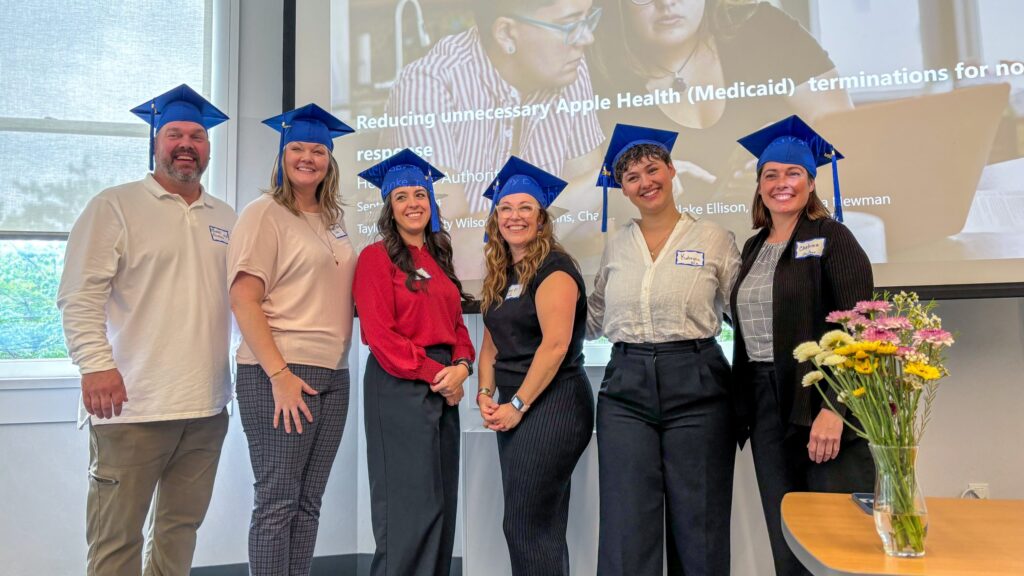
In early 2024, the Evans School launched the Leading Public Innovation (LPI) Graduate Certificate to equip working professionals in the public sector with the tools they need to improve the effectiveness, accessibility, and equity of systems within their organizations. The initial LPI cohort was comprised of 40 participants from eight public agencies. Over nine months, the cohort learned new ways to lead equity-driven, human-centered innovations and bring systems-level change to their organizations.
We sat down with two members of the pilot cohort—Chief of Staff Taylor Linke, and Customer Experience Administrator Amy Dobbins—to reflect on how the program shaped their efforts to improve service delivery at the Washington State Health Care Authority (HCA) in the months following their LPI experience. Taylor and Amy were joined by several of their colleagues from the HCA in the cohort, which sponsored the participation of a diverse team including communications experts, process designers, and executives, to move projects forward within their organization.
For the HCA team, the LPI program provided a timely opportunity to improve outreach to Medicaid participants at risk of losing coverage—not because they were ineligible, but due to minor administrative reasons. Taylor remarked, “We didn’t want to see individuals lose coverage due to the fact that there was an administrative step that could have been resolved…we wanted to tackle a real-life project within our organization that could help us move forward.” The LPI program’s curriculum rooted human-centered design helped them focus on the journey and needs of their clients. They moved quickly to implement a set of questions for their call center agents to ask to learn more about the client’s perspective and communication preferences. HCA’s team also prototyped a series of interventions, from implementing a new text messaging campaign and robocalls, to adjusting the sequencing and content of other communications.
The collective efforts of program-level staff and HCA executives helped turn the team’s insights from the program into reality. Taylor notes that the intentionality behind the team gave them the ability to “target a critical project for our organization and actually do something with what we were learning.” These dynamics enabled the seamless implementation of thoughtful, co-created solutions across the HCA.
Although the project is still in the early stages of full implementation, Amy and Taylor have already seen improvements from adjusting their processes. Changes to their communication methods have resulted in fewer Medicaid/Apple Health recipients experiencing gaps in their coverage, as more enrollees resolve minor administrative issues within the 90-day grace period.
As Amy reflects on her experience in the LPI program, she notes how the emphasis on human-centered design pushed her to reconsider her default ways of thinking. “It’s really important to check your assumptions,” she says. “I have an added sort of perspective…I’m really thinking about the importance of understanding a person’s story, the human story.” Through the internal leadership of folks who participated in LPI, the HCA is working on embedding LPI’s tools and practices across other parts of the agency’s work, such as their lean and health-equity work. Taylor added, “We’re looking at the vision of how we do this overall—not just in one-offs, but how it can embed and mature these sorts of activities moving forward.”
While balancing graduate coursework with full-time roles was challenging, both Amy and Taylor agreed the experience was well worth it—for the insights, the growth, and the strengthened team cohesion. As we look to future sessions of LPI, Taylor closed by noting she hopes their peer agencies will continue to invest in sending folks to the program, particularly groups that include leadership team members that can champion implementation. “I’m hopeful that, even with budget reductions, other agencies will continue to see the real ROI in having sent people through the program and recall this when the budget improves. There is something to learn for every level of individual in the program.”
Visit our Leading Public Innovation page to learn more about this graduate certificate. Applications for the next cohort open in Autumn 2025.